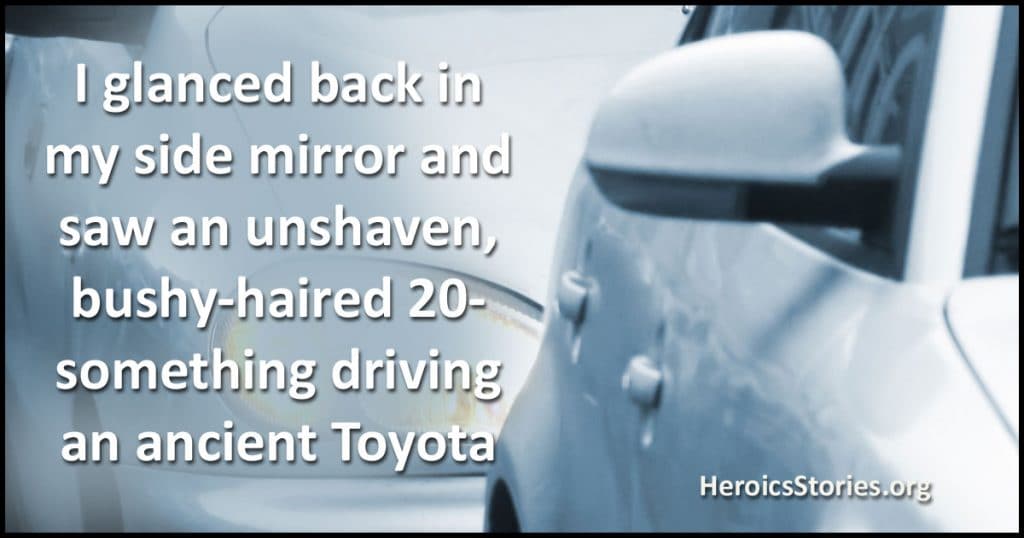by Christine Schowalter
California, USA

They say the average work commute in the USA is 24 miles daily. Well, try commuting in Metro Los Angeles with 15 million other people, where every mile feels like ten. Too much sitting in traffic wears your patience thin, and after eight years, cutting people off had become reflexive for me.
Driving home from work during rush hour in spring 2006, I was running on fumes from sitting on the freeway. I stopped to fill up at the cheapest nearby gas station, which is difficult to drive out of. You have to cross a right-turn-only lane onto a major road.
During green lights, people rush by over 35 miles per hour. At red lights, people pack in behind the light, effectively blocking any chance to infiltrate the throng. The only way across was to gun it while turning into your lane, crossing the right-turn lane in the process. And I was heading home after a doctor appointment at the worst possible time to drive, especially near five colleges with students in the midst of finals.
After filling up I was poised to make my sudden dash for the northbound lane, when the guy behind me started honking insistently. I glanced back in my side mirror and saw an unshaven, bushy-haired 20-something driving an ancient Toyota — a college kid car. I couldn’t discern what color the paint had been; the rear windshield was covered with rock band stickers.
No doubt he wanted to turn right and I was in his way, so I thought, “He’ll just have to wait.” Though not yet 30, I didn’t want to move for this scruffy kid in a beat-up car.
Imagine my surprise when I saw the kid, complete with torn up jeans and rock band T-shirt, jump out of his car, jog up to my rear end, grab the gas cap sitting on my trunk lid, twist it in place, close the gas flap, and jog back to his car.
It only took a moment. I was floored, and ashamed. I got a goofy grin and started waving to him energetically, but I don’t know if he saw, because he was turning right. Even better, people in the northbound and right-turn lanes, whose attention had been grabbed by the honking, paused in their scramble and let me out.
For a year since, whenever I’m at that gas station pulling out, I think about that guy. Was he on his way to final exams? Did he make it in time? He could’ve just handed me the cap. It seemed so much to do for an ungrateful stranger.
I now make a conscious effort to let people into traffic, and I’ve seen those people let other people in — all thanks to that thoughtful college kid. That’s one person’s small, conscious act of kindness spreading geometrically — making busy, preoccupied people take a moment, wake up, and think beyond themselves. A little bit sure does go a long way!
Podcast: Play in new window | Download (Duration: 4:26 — 5.4MB)


I have visited Indonesia, not as a tourist, but as a guest, as my son has married an Indonesian woman. I don’t know if you’ve heard about Indonesian traffic, but it is awful. You simply cannot wait for a break in traffic before making a turn – there are no breaks in the traffic. So a spontaneous service has popped up – at intersections and business exits where there are no signals, there are people waiting to help. They will walk into traffic, signaling for it to stop so that you can make your turn. Then, as you pass, you tip them.
You might think that walking into traffic would not be a good idea, but everyone has the same problem when turning, so traffic will indeed stop. And everyone tips.
Love this kind of simple, everyday story that becomes a pay it forward. Such a small shift in attitudes makes a world of difference. Hope all of you are well! So glad you’re there.